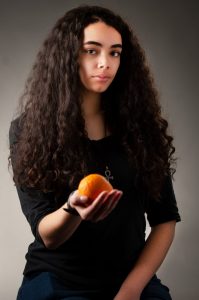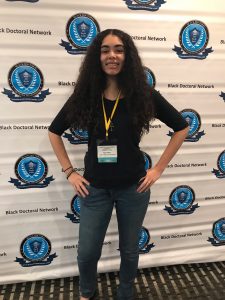
We all know that college students struggle. They struggle with classes, assignments and tests. One can remember the long hours in the library cramming over books in pools of soft light from the rows of lamps, students half asleep, mindlessly present in the real world, fully involved in the world rendered in their minds. That’s what it is like, right? That is the atmosphere at JFK library on campus here in Cheney? Or is that some Hollywood scene. Either way, students fight to stay ahead of the academic agenda. Often, though, college students struggle withmore outside the class room that can cause academic hurdles: food.
Kianna Baker, McNair Scholar, and Dr. Okera Nsombi, her McNair Mentor, have spent the summer doing their Summer Research Internship here at Eastern on food insecurity. What does that mean? It means, according to Baker’s poster, which she presented at the 6th Annual Black Doctoral Network Conference in Charlotte, North Carolina earlier this quarter, “a lack of consistent access to enough food for an active, healthy life.” While this may not seem like a surprise to fellow college students, champions of ramen and cereal with water as meals, it is surprising when Baker and Dr. Okera Nsombi delved deeper into the why. Why is it, that college students, especially Students of Color (SoC), students who receive financial aid, and students that work, face a higher percentage of food insecurity? That was the question, and after reading dozens of articles surrounding the issue, Baker proposed that there might be a link between food insecurity of college students and those who grew up in a food insecure household.

With the help of Dr. Okera Nsombi, who is a highly respected professor of Africana Studies and has taught numerous classes all over the country, Baker was able to produce a survey with IRB approval, to ask students about their food insecurity. She had over 300 student responses. From this survey, “36 percent of EWU students have worried about running out of food.” Not only that, but, “71 percent of EWU students know someone who does not have enough food.” This shows the extent of our community’s food insecurity.
Perhaps Baker’s biggest impact from her research is that this can become evidence that living or growing up in a household that suffers from food insecurity can predict food insecurity in college. Not to mention how this can impact the community by raising awareness about the link between food insecurity and lower GPA.

Through the help and guidance of Dr. Okera Nsombi, McNair, Hunger and Homelessness Awareness Week, EWU Office of Community Engagement and EWU Health, Wellness, & Preventive Services, Baker has truly engaged with the local community here to support her research. Her research matters for SoC, low-income students, and everyone who knows the hardships of living with the fear of where and when your next meal will come.


